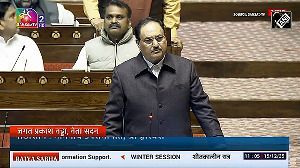Leading South Asia expert Stephen P Cohen has said the US-India civilian nuclear agreement currently under consideration by the US Congress, need not trigger an arms race with Pakistan, "and it is certainly not a green light to India to build a 1,000 or more nuclear weapons".
In a testimony prepared for the Senate Foreign Relations Committee hearing on April 26 titled, 'US-India Atomic Energy Cooperation: Strategic and Non-proliferation Implications,' and made available to rediff India Abroad, Cohen, currently director of the South Asia Program at The Brookings Institution, argues that the initiative "does provide the United States with an opportunity to work with India to help prevent a broader nuclear arms race, something that is certainly not in the interests of India, Pakistan, China, or America".
In order to make the legislation introduced in the Senate on behalf of the administration by Senator Richard Lugar, chairman of the Foreign Relations Committee, more palatable to those lawmakers having concerns, Cohen proposes that the deal "should eventually be folded into legislation that would develop criteria that would allow other states to enter such a nuclear half-way house".
"This half-way house would provide civilian nuclear assistance in exchange for an impeccable horizontal non-proliferation record. Right now, India seems to meet most reasonable tests, as does Israel, but Pakistan and North Korea would not," he said.
Cohen also recommends that the "administration should undertake an initiative that would constrain vertical proliferation via a nuclear restraint regime in Asia, and this initiative would include India, Pakistan and China".
He said that such a regime "need not involve formal, negotiated limits, which would be very difficult to achieve, but certainly could be based upon a fissile material cutoff, continued restraint on testing, and limited deployment of weapons".
While acknowledging that these two do feature in the US-India nuclear initiative, Cohen argues, "They need to be made multilateral, especially to ward off an arms race between Pakistan and India. Of course, China's decision on renewing testing will be shaped by its response to the United States, and I believe that we can continue our own ban on tests indefinitely without damaging nuclear preparedness."
According to Cohen, once this agreement is in place, he believes New Delhi would "feel less paranoid about discussing its own nuclear capabilities and their interaction with those of other states".
"As long as India felt that the US was trying to strip it of its weapons programme, Indian officials talked on endlessly about global nuclear disarmament, but they refused to discuss concrete steps that would enhance India's security through cooperative agreements with others," he noted.
Cohen said that under the auspices of the new Indo-US Agreement on Science and Technology, "The US should assist India in setting up a centre to study 'best practices' gleaned from the American and Russian/Soviet nuclear and missile experience. We should also expect that India will eventually join the process of nuclear arms reduction that began with the US and Russian nuclear cuts."
He expressed his deep disappointment that "such a long-term goal was not even mentioned in the various US-Indian communiques," and warned that "we do not want to continue down the process of arms reduction only to see some of the new nuclear weapons states such as India and Pakistan pass us on their way up".
Cohen, said that while he supports the agreement, "I believe that it should be the initial step in a process of crafting a diplomacy that addresses wider complex arms control and security concerns, not just meeting India's energy needs."
"America has such concerns in an area that stretches from Israel to China; this includes at least five states that have nuclear weapons and two that may be trying to acquire them," he said.
Cohen acknowledged that this deal does much "to repair the torn US-India strategic tie", and is also important "in reshaping and revitalising India's massive energy shortfall, and it has already been helpful in our attempt to constrain an Iranian programme."
But he cautioned that this administration and its successor -- with Congress' assistance -- "should regard it as a beginning, not an end as far as our nonproliferation and strategic interests are concerned".




